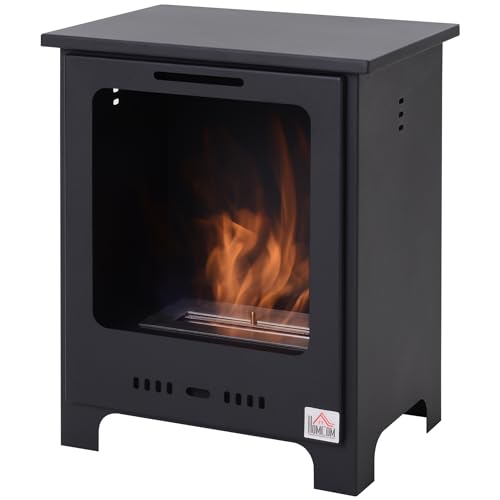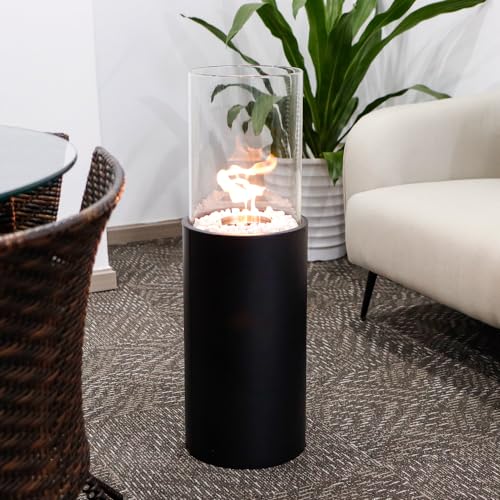15 Shocking Facts About Bioethanol Freestanding Stove You've Never Kno…
페이지 정보

본문
 bioethanol fire freestanding Freestanding Stove
bioethanol fire freestanding Freestanding StoveBioethanol freestanding fireplaces are a great way to create your dream home. Since they don't require a chimney or flue, installation is simple and doesn't interfere with your home.
When selecting the best stove, it is important to take into consideration the initial investment as well as the long-term cost of fuel. Checking specifications like burner reservoir size and adjustable flame height will help you plan for the cost of fuel.
Freedom to Place
A bioethanol stove offers a stylish, modern alternative to wood-burning fireplaces and stoves. The primary benefit is that they don't need a chimney or flue, making them a viable option for homes and rooms with a variety of rooms. They burn clean, liquid ethanol fuel that produces no harmful smoke or fumes. They are a convenient and flexible heating solution.
The versatility of a freestanding bioethanol fireplace allows you to create a cosy and elegant focal point in any room such as an accent or feature piece in your living room or as a warm, intimate backdrop to host guests. The size of the flame can also be adjusted to suit your preference. A larger flame produces more heat, whereas smaller flames emit more of a romantic glow. The finish and colour of the stove can influence the visual appeal. Neutral colours like black or white can be paired with a variety of interior designs. Brighter shades can be used to contrast or complement furniture.
Bioethanol stoves can be set up in a variety of ways, from simple plug and play wall-mounted models that can be fitted in less than an hour to more elaborately designed ceiling or floor-mounted models. Some also come with remote controls, allowing you to have complete control over the heat and flames from your sofa or armchair.
Another thing to take into consideration when choosing a bioethanol stove is the cost and long-term maintenance. While the initial investment might be more expensive than traditional fires but there are typically lower costs for ongoing maintenance, since there is no need to regularly clean or replace of logs and ash. It is also important to consider the amount of bioethanol that your stove consumes per hour. This can affect the frequency at which it must be refuelled, and how much total operating expenses you'll pay over the course of.
Consult a specialist prior to installation if you're considering a bioethanol stove. This will ensure your stove is configured and positioned correctly to ensure maximum performance and safety. They can also offer advice on the best way to maintain your stove, ensuring it is looking and operating as new for as long as possible.
Aesthetics
Comparing a bioethanol-fueled fire to traditional stoves or fireplaces it is extremely simple to set up. All you need to do is fill the burner tray with liquid ethanol fuel and then ignite it. Once it is ignited, you can adjust the intensity and flame height to achieve your desired look. The flame emits a beautiful warm glow that instantly transforms the space and makes it feel warm.
There are also a range of stylish designs to choose from, which makes them ideal for both traditional and contemporary homes as well. Some of the most well-known models come with the curved glass windows that provides an unobstructed view of the flames, and an integrated fireplace log holder that makes it appear like an old-fashioned wood-burning stove. Certain models, such as the Oslo by Henley, are more contemporary and have an open flame effect. They're ideal for creating a cozy environment without the hassle of maintenance.
Aside from being easy to install, the majority of bioethanol stoves also require minimal maintenance. This is thanks to the fact that they don't create any smoke or ash, so you won't need to deal with the mess and dust associated when burning wood. The pure burning of bioethanol fuel also means that you don't need to worry about harmful air pollution.
It is crucial to remember that all fire places made of bioethanol freestanding stove require adequate ventilation. This is because they require oxygen to burn and should you not allow this to happen your stove may catch fire or not be lit. Fortunately, most stoves have built-in safety mechanisms that shut the flame down in the event that oxygen levels are too low.
It is also essential to ensure that your bioethanol stove is positioned away from any flammable materials such as curtains or soft furniture. Some models come with a shut-off feature that automatically shuts them off when they're left unattended for too long and will help increase safety and minimize the risk of damage. It's best to use liquid ethanol instead of solid fuels for your bioethanol stove. This will not only keep your home clean but also save you money and lessen the environmental impact.
Efficiency
A freestanding bioethanol stove often referred to as an ethanol fire or bio fuel fireplace, uses pure liquid ethanol fuel that produces real flames and heat. Their sleek designs and efficient operation have been a hit for modern homes that want to reduce their carbon footprints and enhance the look of their living spaces. To ensure a secure, enjoyable experience, it is crucial that the purchasers are aware of the safety precautions as well as the manufacturer's guidelines.
Bioethanol fuel is an energy source that can be harvested year after year. It is produced by the fermentation of sugars, starches and other starch elements in plants such as straw and sugar cane. The fuel is then produced through a distillation procedure. When the liquid ethanol is ignited, it releases three major by-products : heat and water vapour. These by-products do not harm humans or animals. This makes bioethanol a viable alternative to fossil fuels.
Bioethanol stoves are not harmful since they do not emit smoke or the ash. However, they do require adequate ventilation to work safely. Therefore, they should only be used in well-ventilated areas and kept away from any flammable materials. Some bioethanol stove models come with adjustable burner trays, which allow users to alter the intensity of the flames which can reduce heat output and help save fuel.
The heat output of a freestanding bioethanol stove may differ from model to model but the vast majority have a maximum output of 1kW. This is ideal for heating smaller areas or as a source of heat to warm up larger areas.
Bioethanol fireplaces are an attractive modern heating option that can add to the value of your home while helping you save on your utility bills and chimney maintenance. You can enjoy the aesthetics of a bio fireplace and its warmth without having to pay for costly maintenance by following the manufacturer's guidelines and safety guidelines. As more people become conscious of the environmental impact that their everyday activities have on the environment, the demand for bioethanol stoves is expected to grow.
Safety
Bioethanol stoves must meet certain safety standards in order to be used as an energy source. They do not produce harmful byproducts such as carbon monoxide and are safe to use in rooms that has an open flame. Like all heating solutions, however, ventilation is essential to ensure the best combustion of the appliance and to get rid of harmful byproducts. Careful storage of fuel and installation, as well as maintenance can help prevent potential problems.
A second safety benefit is that, unlike gas fireplaces, ethanol fires don't have an fuel line. This means there is no chance of leaks and accidents involving conduits that are laden with toxic fuel. Because the fuel is liquid and follows the flame if it escapes from the flame, it prevents a runaway fire which can cause property damage or injuries to individuals.
Lastly, bioethanol fireplaces don't require chimneys and can be installed in a range of homes and rooms including apartments, flats and conservatories. They generate a significant amount of heat for their small size, and don't emit smoke or ash. This makes them a great alternative to wood or other gas fireplaces.
When you are searching for a freestanding bioethanol fireplace, you can find models with a variety of styles and finishes that will suit your space and the aesthetic of your home. You can also search by brand, as established and reputable brands typically have higher prices, but they also provide a guarantee of high-quality and after-sales service.
 The final decision will be determined by the balance between your budget, and your long-term operating expenses. Be sure to take into account factors such as the burn time of each fill (usually up to five hours), the rate of consumption of fuel and your patterns of usage. Having an accurate estimate will aid you in determining whether the initial investment is worth it and provide you with an estimate of your monthly or annual fuel expenses. Likewise, you should also take into consideration any accessories that could require purchase such as an airflow control or remote.
The final decision will be determined by the balance between your budget, and your long-term operating expenses. Be sure to take into account factors such as the burn time of each fill (usually up to five hours), the rate of consumption of fuel and your patterns of usage. Having an accurate estimate will aid you in determining whether the initial investment is worth it and provide you with an estimate of your monthly or annual fuel expenses. Likewise, you should also take into consideration any accessories that could require purchase such as an airflow control or remote.- 이전글11 Creative Ways To Write About Seat Leon Key Fob Replacement 24.11.24
- 다음글Daycare Near Me - Find The Best Daycares Near You Reviewed: What Can One Learn From Different's Errors 24.11.24
댓글목록
등록된 댓글이 없습니다.



